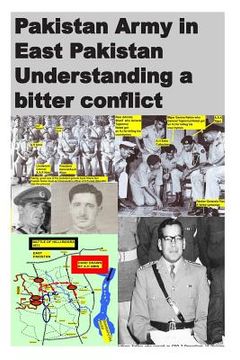Synopsis "Pakistan Army in East Pakistan Understanding a bitter conflict (in English)"
Anthony Mascarenhas was a journalist making is living by writing sensational things but his landmark article of June 13 1971, although hard hitting and sensational was not the whole truth but only a fraction of the whole truth. It is in the interest of all innocents, on all sides, sans race or religion, who lost their lives in that Red Year 1971 that the whole truth be told. Thus my motivation to write this account. June 13, 1971 Anthony Mascarenhas The Sunday Times -Anthony Mascarenhas, Former Assistant Editor, Morning News, Karachi, in Sunday Times, London, June 13, 1971 While the genocide carried out by the Pakistan Army was deplorable and unfortunate, there is more to it than meets the eyes. This work seeks to examine in brief the events of 1971 in a balanced manner. Usurping of power while leading the largely Punjabi based army by Ayub Khan increased the East-West divide in 1958. Things in Pakistani politics were then judged on ethnic lines. In 1950s West Pakistani newspapers wanted provincial autonomy on te same pattern as Sheikh Mujeeb later demanded in is Six Points if Bengalis, who they saw as a lesser race was ranted the right of one man, one vote ! This point was clearly highlighted in the famous book on the six points which I reviewed in 2001 The on ground realities were different. Ayub was not a Punjabi, at least ethnically, but later in 1971 the Bengali Muslims blamed the Punjabis for all their maladies! In reality the Punjabis being leaderless were manipulated by both Ayub and Yahya! Bhutto who played a major role in persuading Yahya to launch the military action was a Sindhi! Figure 1 General Agha Mohammad Yahya Kha Trigger happy use of excessive military force in 1971 precipitated a war which led to the creation of Bangladesh. It appears that the Two Nation Theory had ceased to exist in the killing fields of East Bengal in 1971. But why was the army so actively participating in the genocide? The same Britishers who were so active in criticising the Pakistani atrocities in 1971 as in the had as a matter of fact created this machine following 1857 based on antiquated and irrational ideas of Robert in the post-1880 period. The disease started in 1857 when the British reaped the harvest of the policy of divide and rule when they employed the Gurkha against Indian, and within India the Punjabi (whether Sikh or Muslim) against the Hindustani. The Gurkha against the Punjabi. The Jallianwalla massacre in which Gurkha troops fired on the public meeting comprising Punjabi civilians in 1919 was a good example of the fact that the British did not love the Punjabis, but were merely using them. The Punjabis started learning this from 1919 but by the time the awareness was growing the Britishers were already winding up. The most glaring example of the policy of selective recruitment was in the old NWFP region of pre-1947 India. Here the British deployed one Pathan against another. Sometimes from the same tribe and sometimes from the other. Sometimes the Turi Shia against the non-Shia Wazirs or Mahsuds or Afridis. Figure 1 Royal Air Force planes bomb Waziristan Figure 2 Bombing Waziristan by Westland Wapitis in 1933 The post-1947 rulers of Pakistan instead of remedying a basically illogical recruitment policy which had no logical basis became its victim. Thus whenever army was used in a province other than Punjab it was perceived as "Punjab against Sindh" or "Punjab against Bengal" or "Punjab against Baluchistan"! The rulers were merely the instruments of a pre-1947 policy. The army outside Punjab was trigger happy because it was fighting in a foreign land. For short-term purposes this policy is viable but for how long? In the long-term it will only lead to creation of more Bangladeshis? The British divided us by their negative policies both in India and in Pakistan. In Pakistan the problem became more serious because the military usurpers were not interested in changing

